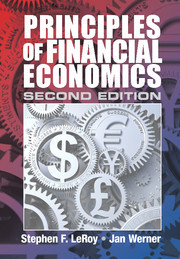Description
Principles of Financial Economics (2nd Ed., Revised edition)
Authors: LeRoy Stephen F., Werner Jan
This second edition includes new chapters on infinite-time security markets and more focus on portfolio choice and risk allocations.
Language: English
Subject for Principles of Financial Economics:
Approximative price 47.64 €
In Print (Delivery period: 14 days).
Add to cart
Publication date: 08-2014
370 p. · 17.7x25.4 cm · Paperback
370 p. · 17.7x25.4 cm · Paperback
Description
/li>Contents
/li>Biography
/li>
This second edition provides a rigorous yet accessible graduate-level introduction to financial economics. Since students often find the link between financial economics and equilibrium theory hard to grasp, less attention is given to purely financial topics, such as valuation of derivatives, and more emphasis is placed on making the connection with equilibrium theory explicit and clear. This book also provides a detailed study of two-date models because almost all of the key ideas in financial economics can be developed in the two-date setting. Substantial discussions and examples are included to make the ideas readily understandable. Several chapters in this new edition have been reordered and revised to deal with portfolio restrictions sequentially and more clearly, and an extended discussion on portfolio choice and optimal allocation of risk is available. The most important additions are new chapters on infinite-time security markets, exploring, among other topics, the possibility of price bubbles.
Preface; Part I. Equilibrium and Arbitrage: 1. Equilibrium in security markets; 2. Linear pricing; 3. Arbitrage and positive pricing; Part II. Valuation: 4. Valuation; 5. State prices and risk-neutral probabilities; Part III. Portfolio Restrictions: 6. Portfolio restrictions; 7. Valuation under portfolio restrictions; Part IV. Risk: 8. Expected utility; 9. Risk aversion; 10. Risk; Part V. Optimal Portfolios: 11. Optimal portfolios with one risky security; 12. Comparative statics of optimal portfolios; 13. Optimal portfolios with several risky securities; Part VI. Equilibrium Prices and Allocations: 14. Consumption-based security pricing; 15. Complete markets and Pareto-optimal allocations of risk; 16. Optimality in incomplete markets; Part VII. Mean-Variance Analysis: 17. The expectations and pricing kernels; 18. The mean-variance frontier payoffs; 19. Capital asset pricing model; 20. Factor pricing; Part VIII. Multidate Security Markets: 21. Equilibrium in multidate security markets; 22. Multidate arbitrage and positivity; 23. Dynamically complete markets; 24. Valuation; Part IX. Martingale Property of Security Prices: 25. Event prices, risk-neutral probabilities, and the pricing kernel; 26. Martingale property of gains; 27. Conditional consumption-based security pricing; 28. Conditional beta pricing and the CAPM; Part X. Infinite-Time Security Markets: 29. Equilibrium in infinite-time security markets; 30. Arbitrage, valuation, and price bubbles; 31. Arrow–Debreu equilibrium in infinite time.
Stephen F. LeRoy is Professor of Economics Emeritus at the University of California, Santa Barbara. Early in his career, he was an economist in the research departments of the Federal Reserve Bank of Kansas City and the Board of Governors of the Federal Reserve System. He then moved to the economics department at the University of California, Santa Barbara. He also served as Carlson Professor of Finance in the Carlson School of Management, University of Minnesota. He has had visiting appointments at the University of California, Berkeley, the University of California, Davis, the California Institute of Technology, and the University of Chicago. He earned his PhD in economics from the University of Pennsylvania.
Jan Werner is Professor of Economics at the University of Minnesota. He has taught at the Pompeu Fabra University, Barcelona, the Institute for Advanced Studies in Vienna, and the Central University of Finance and Economics, Beijing. He has had visiting appointments at the University of Bonn, the European University Institute, Florence, and Université Paris Dauphine. He serves on the editorial boards of Economic Theory, the Journal of Mathematical Economics, the Annals of Finance, and the Central European Journal of Economic Modeling and Econometrics. He earned his PhD in economics from the University of Bonn.
Jan Werner is Professor of Economics at the University of Minnesota. He has taught at the Pompeu Fabra University, Barcelona, the Institute for Advanced Studies in Vienna, and the Central University of Finance and Economics, Beijing. He has had visiting appointments at the University of Bonn, the European University Institute, Florence, and Université Paris Dauphine. He serves on the editorial boards of Economic Theory, the Journal of Mathematical Economics, the Annals of Finance, and the Central European Journal of Economic Modeling and Econometrics. He earned his PhD in economics from the University of Bonn.
© 2024 LAVOISIER S.A.S.
These books may interest you

Principles of Financial Economics 105.47 €



